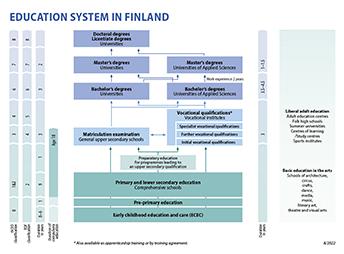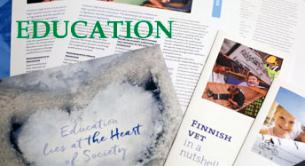The Finnish education system
Education is one of the cornerstones of the Finnish welfare society. We pride ourselves on an educational system that offers equal educational opportunities for all. Education all the way from pre-primary to higher education is free of charge in Finland. In addition, Finnish teachers are highly educated and strongly committed to their work.

The Finnish education system consists of:
- early childhood education and care which is provided for children before the compulsory education begins, (at the age of seven normally)
- pre-primary education which is provided for children in the year preceding the beginning of compulsory education,
- nine-year of primary and lower secondary education (comprehensive school), which is compulsory
- upper secondary education, which is either general upper secondary education or vocational education and training, and
- higher education provided by universities and universities of applied sciences.
- Furthermore, adult education is available at all levels. Liberal adult education offers non-formal studies.
- Basic education in the arts is goal-oriented education in different fields of art
Bigger picture of the Finnish education system.
El sistema educativo Finlandés.
Early childhood education and care supports the development, learning and wellbeing of children
Early childhood education and care (ECEC) combines education, teaching and care in a systematic and goal-oriented way. The goal of ECEC is to promote children’s development, health and wellbeing as well as to improve children’s opportunities for learning.
Local authorities, i.e. municipalities, are responsible for providing ECEC for children under school age. A client fee is charged for early childhood education and care. The fee is determined on the basis of the family’s income and size and on the time that the child spends in ECEC.
Finland’s National Core Curriculum for Early Childhood Education and Care, approved by the Finnish National Agency for Education, guides the planning and implementation of the contents of ECEC, and gives a framework for drawing up the local ECEC curricula.
Pre-primary education improves children’s opportunities for learning
Pre-primary education aims to give children better opportunities for learning and development. Pre-primary education plays an important part in the continuum stretching from early childhood education and care to primary and lower secondary education. Pre-primary education is provided free of charge and it has been compulsory for all children in Finland since 2015.
Parents and other guardians must make sure that their child participates in pre-primary education or other corresponding activities that meet the objectives set for pre-primary education. The National Core Curriculum for Pre-Primary Education, approved by the Finnish National Agency for Education, guides the planning of the contents of pre-primary education and gives a framework for drawing up the local curricula.
Compulsory education starts with comprehensive school and ends at the age of 18
Comprehensive school education (primary and lower secondary education) consists of school years 1 to 9 and is meant for all children aged between 7 and 17 (whole age group). Compulsory education generally starts in the year in which children turn seven. All children who reside permanently in Finland must attend compulsory education.
Primary and lower secondary education (comprehensive school) is free of charge. Comprehensive schools are maintained by the local authorities (municipalities) and other education providers. Less than two per cent of primary and lower secondary school pupils go to a private or state school.
At the end of comprehensive school, each learner must apply for post-comprehensive school education. Compulsory education ends when the learner reaches the age of 18 or when they complete an upper secondary qualification (a general upper secondary qualification or a vocational qualification).
A preparatory education (TUVA education) for the transition from lower secondary to upper
secondary education provides students with the necessary knowledge, skills and abilities to
apply for an upper secondary qualification. It is intended for pupils of compulsory education
age, for students with immigrant background as well as for those adult learners, who are lacking
the upper secondary qualification. The training lasts for a maximum of one year. TUVA is not
compulsory; it is designed to provide an extra support for learners. During the preparatory year
students also have more time to think about their further studies and career choices.
Choosing general or vocational upper secondary education after comprehensive school education
After comprehensive school, students continue to the upper secondary level and choose between general education and vocational education and training.
General upper secondary education (lukio in Finnish) provides, as its name suggests, general education. It does not qualify students for any particular occupation. At the end of general upper secondary school, students take a national school-leaving examination known as the Finnish matriculation examination. Those who pass the examination are eligible to apply for further studies at universities, universities of applied sciences and vocational institutes. General upper secondary education usually takes three years to complete.
Vocational qualifications include initial vocational qualifications, further vocational qualifications and specialist vocational qualifications. Initial vocational qualifications give the basic skills required in the field. Further and specialist vocational qualifications enable people to develop their skills at different stages of their career. The scope of initial vocational qualifications is usually 180 ECVET points, that of further vocational qualifications is 150 points, and that of specialist vocational qualifications is 180 points.
At the beginning of vocational education and training, the student and the institution draw up a personal competence development plan for the student, outlining the content, schedule and methods of study. Vocational education and training can also take place in workplaces by means of an apprenticeship agreement or a training agreement. Prior learning acquired in various ways can be identified as part of the studies. Both young people and adults can apply for vocational education and training.
Graduates of vocational education can apply for further studies at universities or universities of applied sciences.
The Finnish higher education system comprises universities and universities of applied sciences
The mission of universities is to conduct scientific research and provide education based on it. Universities of applied sciences offer more practical education that aims to respond to the needs of the labour market.
Universities, which provide higher scientific and artistic education, award Bachelor's and Master's degrees as well as postgraduate degrees, i.e. licentiate and doctoral degrees. Universities of applied sciences award Bachelor's degrees and Master's degrees.
The normative duration of studies for a Bachelor’s degree at a university is three years and for a
Master’s degree an additional two years. The completion of a degree at a university of applied sciences usually takes between 3.5 and 4.5 years. The requirement for Master's studies at a university of applied sciences is a Bachelors' degree or another appropriate degree and at least two years of work experience after the completion of the previous degree.
Education and training in the spirit of lifelong learning
Adult education and training training encompasses education leading to a qualification, degree studies, training preparing for competence-based qualifications, apprenticeship training, further and continuing education that provides upskilling and reskilling, studies in subjects relating to citizenship skills, working life skills and society, and studies in different crafts and subjects on a recreational basis.
Adult education and training can be paid for by the students themselves or it can consist of apprenticeship training, labour policy education, or staff-development and other training provided or acquired by employers. Various educational institutions that mainly provide education for young people, educational institutions that provide only adult education, private companies, and workplaces (staff development) all provide adult education and training.
Liberal adult education offers non-formal studies. It promotes personal growth, health and wellbeing by providing studies relating to citizenship skills and the society, and courses in different crafts and subjects on a recreational basis. Liberal adult education institutions include adult education centres, folk high schools, learning centres, sports training centres and summer universities. An essential aspect of liberal adult education is that everyone has the right to apply to take part in it. These studies do not provide a degree or qualification, and its content is not governed by legislation.
Basic education in the arts is goal-oriented education in different fields of art, progressing from one level to another. It teaches children and young people skills in self-expression and capabilities in their chosen art form needed in vocational education and training and in higher education.
The Finnish Way: Comprehensive education
youtube
The Finnish Way: Vocational education and training
youtube
The Finnish Way: Higher education
youtube
Links to other websites
Eurypedia database - descriptions of national education systems, comparative studies devoted to specific topics, indicators and statistics in the field of education. Information about organisation of the school day, assessments, funding, teachers etc.



